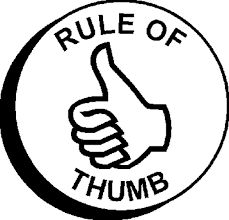Sometimes the best ideas and best advice are the most simple.  When I read the following article a while back, I loved it. And believed it. And continue to believe it. Michael Raynor and Mumtaz Ahmed from Deloitte Consulting performed a study that began with 25,000 companies to find outstanding companies that truly perform. A longer piece they wrote for the Harvard Business Review can be found here and it goes beyond their simple “truisms.” Their book is “The Three Rules: How Exceptional Companies Think.”
When I read the following article a while back, I loved it. And believed it. And continue to believe it. Michael Raynor and Mumtaz Ahmed from Deloitte Consulting performed a study that began with 25,000 companies to find outstanding companies that truly perform. A longer piece they wrote for the Harvard Business Review can be found here and it goes beyond their simple “truisms.” Their book is “The Three Rules: How Exceptional Companies Think.”
Here are there three rules, simplified:
- Better before cheaper. In other words, compete on differentiators other than price. Some companies create a successful strategy on price (Walmart, Costco, GEICO, etc.) but I agree that it is more likely that one will be able to create a competitive advantage on things other than price. With price and efficiency, it is too easy for competitors to observe what you are doing and eventually copy your product or service. With other elements of differentiation, it is easier to find areas where your competition could not compete even if they wanted to because of something inherent in their product, their customer base, their investor base, their sales channel, or from many other factors.
- Revenue before costs. That is, prioritize increasing revenue over reducing costs. It is difficult to be world-class at reducing costs more than the next guy. It is just too easy for others to copy (usually) and reducing costs as a core competency is not really a competitive advantage. Being frugal and cost-conscious is a part of many successful companies, but it is not their core strategy. Plus, reducing costs is difficult and no fun. It creates a different vibe. Some people can be excellent at this strategy, such as 3G Capital or certain other private equity funds, but I agree that it is not a primary path to greatness.
- There are no other rules, so change anything you must to follow Rules 1 and 2.
Foundational concepts
As the authors write, “The rules don’t dictate specific behaviors; nor are they even general strategies. They’re foundational concepts on which companies have built greatness over many years. How did these organizations’ leaders come to adopt them? We have no idea—nor do we know whether the executives even followed them consciously. Nevertheless, the rules can be used to help today’s and tomorrow’s leaders increase the chances that their companies, too, will deliver decades of exceptional performance.”
Related Posts and Topics:
- Joys of Ice Cream, Apple Pie and Recurring Revenue
- Business improvements in marketing as well as factory
- Early revenue and profits mark you for success


 I am an investor at Greybull Stewardship, an
I am an investor at Greybull Stewardship, an 
 Sign Up
Sign Up RSS Feed
RSS Feed